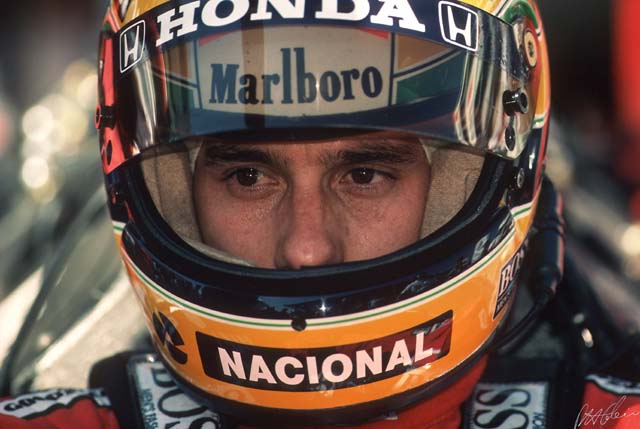
How Can I Go On?
|
I stand dethroned Iím naked and I bleed But when your finger points so savagely Is anybody there to believe in me To hear my plea And take care of me How can I go on From day to day Who can make me strong In every way Where can I be safe Where can I belong In this great big world of sadness How can I forget Those beautiful dreams that we shared Theyíre lost and theyíre nowhere to be
found How can I go on Sometimes I tremble in the dark I cannot see When people frighten me I try to hide myself So far from the crowd Is anybody there to comfort me Lord... take care of me
|
Sung
by:
Lyrics by: Freddie Mercury, Mike Moran
1988.
"
This
was the year Ayrton got "the real racing car". McLaren Honda, in his
hands, could result with only one thing - the world championís title. But it
wasnít all that simple as it may appear. One would say, thinking superficially,
that to driver of Ayrton Sennaís size, who was gifted with so a great talent (although
it wasnít just given to him; he brought his indisputable talent to perfection
through hard work and comprehending his responsibilities), it wasnít difficult
to get hold of the world title. And how far from the truth that is because
Ayrton didnít win a single race without a fight or outstanding efforts. He
fulfilled every single obligation honestly and with devotion. And apart from all
those details familiar only to the people in this dangerous sport, there was
also a special "human factor" for Ayrton, there were "those who
couldnít understand". They were an additional aggravating circumstance
because they very frequently blocked him, withheld his due not being able to see
him as a outstanding human being he was whom, in their lack of understanding,
they called a "man-machine".

Portugal 1988
And
Ayrton had a turning point in his career that year: "
Monaco
Ď88" happened to him. First there was the qualifying session.
Particularity of his style of driving through the session set him apart. Later,
Ayrton himself tried to describe it:
"I
felt as though I was driving in a tunnel. The whole circuit became a tunnel... I
had reached such a high level of concentration that it was as if the car and I
become one. Together we were the maximum. I was giving the car everything and
vice versa... Suddenly it was as though I woke up and noticed that I had somehow
been on a different level of consciousness. I was really shocked, and I went
straight back to the pits - and I didnít drive any more that day. I realized
that I had been in a kind of unending spiral. Faster and faster, closer and
closer to perfection... But also more and more vulnerable, with less safety
margin..."
This
was the point where Ayrton came closest to what he was craving for, to
perfection, but at the same time he saw the price for it. In shock he realized
if he gives himself up to the call of speed to the full it will cost him his
life, and if he doesnít do it, there arenít many reasons for driving because
the mere world title, after these experiences, has a little meaning. The most
important moment for Ayrton Senna in his whole career was inexorably getting
closer. He said the following about that moment:
"The
mistake I made changed me psychologically and mentally."
This
mistake happened on Sunday: he was leading the race with 49 seconds gap, 12 laps
before the end and suddenly, he found himself in the fence. One second before he
was holding everything in his hands and also had additional unused potentials in
reserve and the next second everything was gone incomprehensibly fast. All the
glory and misery of peopleís aspirations flashed in front of his eyes in that
moment. And the only thing that the others saw was Sennaís capital loss of
concentration. Everything else remained hidden, Ayrton immediately went away
from the track and he withdrew himself into absolute solitude. Many questions
needed to be answered by him: consciously and irrevocably. And one was crucial: why
am I still sitting in the racing car and risking my life over and over again when
the boundary lines are so thin, human being so fragile and the reward so
relative? He was searching for the real answer to that question for days
because now he knew that the real answer has to exist. He realized that values
must be disposed differently otherwise everything wouldnít make any real sense.
And he found the real sense not with his intellect but with his big heart which
had room for the entire world. He realized that he wasnít racing only because
he wished so, only because he loved speed and victories, but that F-1 is means,
a way for him to act most efficiently and broadly in this world because many
people had needed him so they could have experienced dignity and feeling of
success through him - several moments of happiness. His words spoken to dr. Sid
Watkins (when he was asked a day before his death why doesnít he finally quit),
also prove that in
Monte Carlo 1988
This
was the reason he didnít quit, not even in Imola Ď94 (although he surely
knew then that he had dangerously drawn to the boundary-line), because he
didnít belong only to himself any more. He became the possession of millions
because for people abstractions are never enough. People need concrete examples,
they want to see their ambitions and aspirations incorporated, they need a point
of support. Ayrton became that point of support and there was no way back for
him, not for a man like Ayrton.
Once
he spoke about what had happened to him in
Monte Carlo
:
"It was a growing need for answer to
me, about me, about our lives. All the things we are aware of and all those we
are not aware of in our lives were given to us by God, regardless of whether we
understand or not why we live in a certain way."
Ayrton
has in any case been loyal to his mission till Monaco
'88 unconsciously and from that time on consciously. That was how the second part
of his career began, although it remained exactly the same at first sight
because Ayrton didnít change his habits. He only consciously and with full
responsibility took upon himself the weight of his mission. And from that time
on he always tried to stay on this side of the boundary-line because he realized
the value of the most precious gift that was given to a man - life.
"Life
is something that God gives us but in most instances it is up to us to use our
commonsense to show God that we understand that life and health are great gift
from him. Itís our responsibility to preserve such an important gift",
he said. That was the reason he never again allowed himself to go so far like on
qualifying in
This
very important season in the life of Ayrton Senna also had its dramatic and a
very special ending. The fight for the title ended in Suzuka. He described what
happened to him during that race:
"That
was an incredible day. First pole, then a lousy start. I already lost it all,
but still I managed to find strength to fight, I had to drive with the highest
aggressiveness without making a single mistake. That was one of those days when
everything comes out of you, all your natural abilities, you donít find a day
like that always. I said to myself go, go, go and then I crossed the finishing
line.
I was thanking God for this victory, for this great gift, when I saw before me a huge picture of Jesus. It was incredible! I was actually still driving with full concentration, with everything that I had - and yet there was suddenly this vision."
It
was indeed an incredible day. His engine stalled on the start. "It
was partly the clutch, partly my fault", he explained. And a stalled
engine at the start means the race is over but not this time, not for Senna in
Suzuka. The slope of the track saved him.
"I dropped the clutch and got going and the engine stalled again but I managed to pick it up a second time and staggered away. I was really lucky", Senna described this late start. After lap 1 he was on the eighth place and his only real competitor (and teammate) Prost was on the first. Everything changed until lap 19, Senna was now behind Prost. And after next eight laps he took the lead. Ayrton drove through the last lap with a cool mind like a surgeon, careful not to make a single mistake. As he was coming through the last bend, on such a high level of concentration, something special was waiting for him and it wasnít just the world championís title. He got the real prize when he was coming through the last bend; it was the confirmation that his work was noticed and adored. During the winnerís lap he lifted his visor and rain blended with his tears:
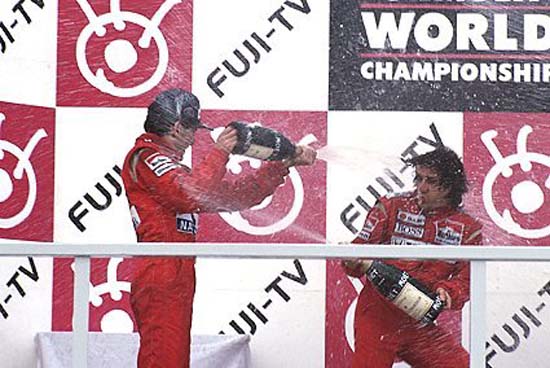
Suzuka 1988
"Yes, I cried as I drove
through the finish", he confessed without hesitation. These were a
different sort of tears from those that awaited him at this same place next year.
This
is how Ayrton Senna won his first title.
1989.
INIQUITOUS JUDGES ACTING
Psychological experiences such as those canít stay unnoticed. They canít be hidden behind any sort of mask and a person who experiences them inevitably changes, begins to understand things in their real light. Unfortunately not many people are prepared to talk about those experiences also in public. They are afraid because they know people will laugh at them. Ayrton wasnít afraid, he talked. It isnít hard at all to imagine what some people said about his experiences: he has a screw loose. He asserts he saw God! - they unavoidably came to such a conclusion.
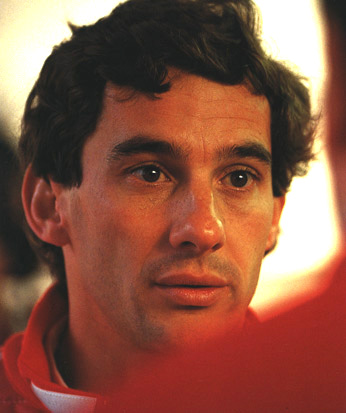
It
was a well-known thing that Ayrton prayed before each race Ė ďhe prays to be
the first at any costĒ - that was all that people could conclude out of it.
And he didnít pray to be the first at any price. He prayed to do the job he
had to do to the best of his abilities, the most fairly, properly, to achieve
the best possible result that circumstances were allowing and bring the work of
many hands to its end with his own strength, in the best possible way. That was
the reason he could walk away from the track when his car broke down,
disappointed but peaceful in his heart. His thoughts were already on the next
race, on the improvement that could be done to the car, but he couldnít get
over the situation when he was prevented in racing by stupidity, or even worse,
injustice, hypocrisy of those who were setting double rules. Injustice would
make him sick, but he wouldnít surrender, he always tried to fight.
"Justice,
honesty - thatís what itís all about, those are important values in my
life",
he was talking in front of the crowd of cynical journalists at a
press-conference in Adelaide 1989 trying to explain the depth of the injustice
caused by disqualification in Suzuka for him while the tears were in his eyes.
Because Ayrton wasnít able to suppress tears when he came across a situation
in life which called for tears. His eyes would always disclose what he felt and
think in a certain moment. He could never hide pain and sadness as well as joy,
after all, no matter how he tried. And also in Imola Ď94 he wasnít able to
hide the tears for Roland. Others were able to do it but he wasnít. People
found that strange because tears, sincere and unabashed tears are rarely seen;
only very few people carry in their souls so great values that they are prepared
to defend them publicly and with tears. Ayrton had "a gift of crying"
(this is how Dostoevsky called this outside aspect of a gentle heart). But in
this world "a gift of crying" is no sort of gift at all, it is more a
kind of a curse.
And
why wasnít Ayrton able to suppress his tears in
"I
didnít cause the accident in Suzuka",
Senna was explaining, "It was never
my responsibility and you should see that in the video, not by my own words."
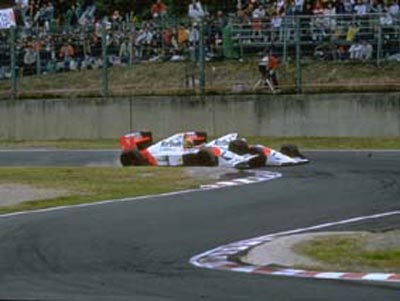
Suzuka 1989
We
saw. We understood. It wasnít his fault. And he didnít give up after the
crash with Prost: he came back to the track and drove to the end of the race. He
didnít just think he was the winner, he was the winner. He became one in front
of everybody but still, he was disqualified, deprived of his victory, chance of
winning the title, they prevented him from going to the podium... He tried
everything in human power to fight out for the justice. He opened his heart,
bared his soul and asked for support like a child. He said the truth about the
real state of things to everyoneís face. A dangerous way since he was alone
against the system and thatís a fight that always ends the same - the system
wins. He was forced to drink a cup of ill blood to the bottom - it was a lesson
he never forgot but it didnít change him. "I
never forget that", he said a few years later when he was asked about
it. And he didnít forget, but he forgave.
Suzuka 1989
It
is a great irony that Ayrton had to live the hardest moments of his career in
|
FOOTPRINTS
IN THE SAND ONE
NIGHT I HAD A DREAM... I
DREAMT I WAS ON THE BEACH WITH THE LORD AND, IN THE SKY, I
COULD SEE SCENES OF MY LIFE! FOR
EACH SCENE THAT WAS SHOWN I NOTICED THAT TWO PAIRS OF
FOOTPRINTS WERE MADE IN THE SAND. WHEN
THE LAST SCENE WAS SHOWN BEFORE US, I
LOOKED BACK TO THE FOOTPRINTS IN THE SAND AND I NOTICED THAT
MANY TIMES, IN MY LIFEíS PATH THERE
WAS ONLY ONE PAIR OF FOOTPRINTS IN THE SAND. I
NOTICED, TOO, THAT THAT HAD HAPPENED IN THE MOST DIFFICULT AND
DEPRESSING MOMENTS OF MY LIFE. THIS
BOTHERED ME A LOT. THEREFORE I ASKED THE LORD: "LORD, YOU TOLD ME THAT ONCE I DECIDED TO FOLLOW YOU YOU
WOULD ALWAYS WALK WITH ME, ALL THE WAY, BUT
I NOTICED THAT DURING THE BIGGEST TURBULATIONS I WENT THROUGH, THERE
WAS ONLY ONE PAIR OF FOOTPRINTS ON THE SAND OF THE WAY OF MY LIFE. I
CAN`T UNDERSTAND WHY, WHEN I NEEDED YOU MOST, YOU
LEFT ME." THE
LORD ANSWERED ME: "MY PRECIOUS SON; I LOVE YOU AND I WOULD NEVER LEAVE YOU IN
YOUR HOURS OF PROBATION AND SUFFERING. WHEN
YOU ONLY SAW A COUPLE OF FOOTPRINTS IN THE SAND, THAT WAS THE MOMENT WHEN I CARRIED YOU IN MY ARMS." *
|
1990
- "AND WHAT IS DISHONEST IN WISHING TO
WANT TO WIN?"
Ayrton
Senna
ďHope put off makes the
heart sick, but desire fulfilled is
a tree of life.Ē
Proverbs,
13, 12
After
that arduous end of the season even more arduous arguing about issuing his Super
License followed. All that conditioned that he started the 1990 season without
joy:
"Itís only out of responsibility
to the team that Iím driving at all... So many people and their jobs depend on
my decision, I have to think about that, too",
he said this at the beginning of the season forced to do it by the structure of
his soul which didnít allow him to walk away from something just like that Ė
that irrational factor again. And what about people around him? They had
trampled down the most sacred thing that was the essence of life for him, and
then they wanted to show how generous they are, they offered hands of
reconcilement, and since Senna was "a believer" that seemed to be
understandable by itself. But it still wasnít the right time. There was no
hate in Sennaís heart, only bitterness, and only time would soften it. As time
went by Senna forgave everyone in his heart, but now it was still too early. And
the end of the season showed exactly how much too early.
Suzuka
again. And iniquitous judges as well as unfair decisions. When Senna already won
the pole and wanted a fair fight for the title, out on the track, and then let
the better man win, him or Prost, the authorities deprived him again. They
decided he has to start from the right, worse side of the grid although he and
Gerhard Berger agreed with them on Wednesday before qualifying (and Prost agreed
with it, too) that whoever gets the pole will start from the better, left side.
But, the boss Balestre didnít like it because Ayrton won the pole position,
and he said "NO". When he couldn't stop him, he at least tried to make
his way towards victory more difficult. And Ayrton? How must have he felt then
when he knew very well from the previous yearís bitter experience that cry for
justice wonít yield up any fruit regardless of so obvious deliberate injustice.
It is written in the Bible that Jesus was once full of anger and sadness because of the hardness in hearts of people which were around him. And he said to them: "O unbelieving and perverse generation, how long shall I stay with you? How long shall I put up with you?" I'm sure something-similar was in Ayrtonís heart at that moment. Wrath and sadness are the feelings which filled his heart. Wrath because of the injustice and sadness because of not being able to prevent it. But when you know youíre right, you have to go on, and he himself explained to us best how he was going to do that:
Suzuka 1990
"I was
so frustrated I promised myself that if after the start I lost first place, I
would go for it in the first corner, regardless of the result. I would go for it
and Prost wouldnít turn into the first corner ahead of me."
Pay
attention to these words: I will go forwards at any cost, IMMEDIATELY, if Prost
gets the advantage because of the unfair decision! If they had started fairly,
their duel would have lasted for much longer, but we will never know its outcome,
and in this way the race ended after 10 seconds for both drivers. Prost needed
the victory in order to hold the chance of winning the title, Senna didnít and
due to Prostís giving up Senna immediately became the champion.
Suzuka 1990
This
winning of his second title brought him the most criticism. Still, he didnít
expect that they would attack him so vehemently. Exhausted, he withdrew behind
his wall with words: "I donít
care". This time he didnít at any cost try to explain what is the
cause and what the consequence because whatís too much is too much.
Despite
this, the race in Suzuka 1990 entered the annals as "Sennaís revenge"
- Senna deliberately put Prost out of action in the first bend as a retaliation
for the Ď89 - this was (and stayed) a general conclusion. Since this sentence
explains that incident so rationally and logically and seems to be so final in
its judgement, who would still dare to offer some other explanation! Shall we
try anyway?
Letís go little back to the past, to Imola 1989. The two team mates and rivals, Prost and Senna, had made a pact there that they wouldnít take unnecessary risks in the early stages of the race so that whoever would be first in the first bend could stay in the lead till the end of the race. A great agreement, as it seemed, but it was seen later that it wasnít so great, because it was very imprecise, without clearly defined places where they were not allowed to overtake one another. Ayrton pointed out later that the arrangement was only referring to the braking zone while entering the bend but this can be interpreted in various ways because every driver defines the braking zone for himself. Prost understood the situation in his way and confident in his advantage he was driving in Tosa bend like "a professor entering a classroom"- far more relaxed than he would have been if there hadnít been for that unfortunate pact. He was also braking much earlier than necessary and that was a mistake because right behind him was the Brazilian who already regretted for having made any sort of agreement at all. He was at pains to drive behind Prost because it was a limitation, "driving along with everybody else", everything that his nature didnít bear. It is possible to overtake him before the braking zone - detected Sennaís racing sensors which couldnít stand waiting and were faster than Senna himself. Prostís style of driving enabled that and it also called for it in one hand because Senna was forced, in full swing of velocity, either to overtake Prost or to brake like mad risking to very dangerously block everybody behind him. Later he explained:
Imola 1989
"I had
to do it for self-protection, because he started braking so early that others
would have crashed into us if I hadnít passed by."
After
all, this wasnít the first time something like this happened. Senna often
bitterly complained about the drivers who would suddenly block everyone behind
them by braking too early. He saw those situations as extremely dangerous.
So,
thatís how it happened that Senna, despite the pact, took the lead to Prostís
great consternation, a real shock. It hurt Prost deeply. He felt jeopardized.
Ayrton realized it, he saw that he threw his balance into disorder. He respected
sincere feelings of another human being and he was also aware that their pact
wasnít a precise one and that Alain had good reasons to think he was cheated:
that was why he relaxed from his principles and apologized himself.
Without
knowing all the details of the agreement between Prost and Senna we canít
judge here how much Ayrton was to blame. Based on the available information we
could conclude Ayrton made a mistake in the fervency of the combat. He just
simply couldnít resist not to seize the opportunity. But this would be a
correct conclusion if they had had clearly defined points where they werenít
allowed to attack but it looks this wasnít the case here. And another thing is
that this pact wasnít valid only in Imola 1988. It was Prostís idea and the
two drivers were practicing it over a longer period of time in different ways.
If they were on good terms it was valid and if not they ignored it (so it means
that it wasnít sacred as we could conclude from Prostís tumultuous reaction.)
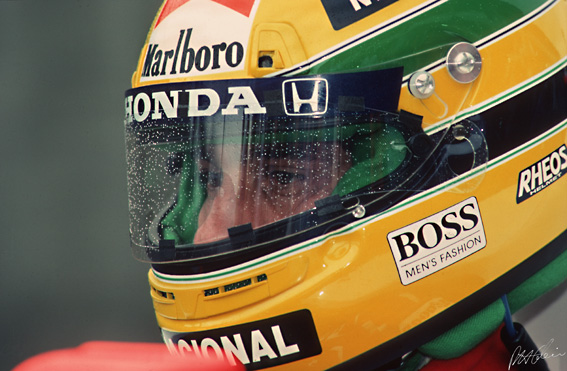
Brazil 1990
Supposing Ayrton did make a mistake on the track, Prost most certainly made one outside the track because no matter what has happened this conflict had to be settled in the way that the agreement itself was made - internally. But Prostís wish to punish his disobedient student was too big. Something that would have passed unnoticed on some other occasion was used as a weapon here. Prostís entire frustration rose to the surface. It was hard for him to bear the fact that Senna wasnít what he was hoping he would be - a second fiddle. He made such a fuss that even Ron Dennis had to intervene because he was afraid for his dream team to fall apart. They pressurized Senna from every direction, trying to make him apologize to Prost so he calms down. Nobody could have talked Senna into something like that because he didnít think he had betrayed the agreement and didnít consider himself guilty if he himself hadnít sensed the disharmony in this situation and become aware of the fact that the competition couldnít continue without reestablishing the equilibrium. That was the reason he apologized to Prost and, as it immediately turned out, it was a mistake because his apology wasnít accepted in the same way it was given - in a wish to normalize things, but as a public confession of his guilt (and we know the rule: once guilty, always guilty).
Only
few days later it was Ayrtonís turn to be consternated. "Senna apologized
to me in tears", "I donít want to have anything more to do with him,
heís not sincere" - those were the headlines from the French newspapers
screaming at his face. The unfortunate Prostís tendency to politicize and
prattle hurt the modest and discreet Brazilian to the core this time. He
withdrew without words. His imaginary wall was bigger than ever before. If the
Frenchman had been more tactful, they would had never become such big enemies
but in this way all the respect the Brazilian had towards him was gone. Ayrton
said the following about it on one occasion: "I
have long since lost my respect for Prost".
And
from that time on Prost, who despised being pushed and forced to change his
style of driving, always reacted in the same way whenever he saw the nose of
Sennaís car getting closer in the bends. He would immediately try to "close
the door", regardless of the consequences. Thatís how we got Suzuka
Ď89 and Ď90, the most famous consequences of rivalry between Prost
and Senna.
Senna
got to know Prost and his reactions very well. And that was on his mind when he
said this enigmatic sentence on Saturday before the race in Suzuka 1990:
"Perhaps I will be the world
champion tomorrow before the race is finished."
And really, on Sunday, Prost hastily "closed door" on Senna, because
still he wasnít hoping that he Senna would attack IMMEDIATELY, already in the
first bend, so that he didnít have time to think that he would eliminate
himself from the race by doing that. He focused too much on trying to escape the
Brazilian already at the very beginning of the race, because he saw his biggest
chance in it Ė he had a better car.
Now
carefully read these few sentences which Ayrton said, some of them the same day
after the race (because the journalists were pressurizing him even late in the
afternoon to confess how he deliberately put Prost out of the action), and some
not until one year later when he allowed himself to say what he felt. It is
meticulously noted that he was using a lot of expletives because Ayrton would
sometimes (just like all of us) use bad language when the situation in life
called for it.
This
is how Ayrton was trying to explain the incident in Suzuka 1990:
"Prost
knows very well that I always drive to the maximum. It is his fault that he
blocked my way. First he made an impression that he was leaving me enough space,
and then he blocked me. He had to realize that I have a bigger acceleration. He
made a mistake when he ignored me. He took the risk and it didnít pay itself
out. Prost simply made an error in computing. Am I responsible for him?"
"If
you get (...) every single time when youíre trying to do your job cleanly and
properly by the system, by other people taking advantage of it, what should you
do? Stand behind and say "thank you, yes, thank you". No, you should
fight for what you think is right. And I really felt that I was fighting for
something that was correct because I was (...) in the winter and I was (...)
when I got pole. I tell you, if pole had been on the good side last year,
nothing would have happened. I would have got a better start. It was a result of
a bad decision. And we all know why. And the result was the first corner. I did
contribute to it, yes, but it was not my responsibility." *
And
in one book it is noted that he answered the question about possible prevention
of the crash through braking by another question: "And what is dishonest in wishing to want to win?"
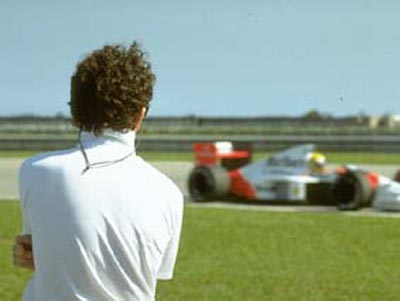
Prost watching Senna
What
else can be said about the famous Suzuka? They could have been the greatest
sporting duels in the most positive sense because their protagonists were
exceptional sportsmen if they hadnít been destroyed by politics because Prost
wasnít a lonesome fighter like Senna, he had the system behind him.
1991.
INTERLAGOS UNDER RAIN
The 1991. season brought Senna his third title. So, the season was very successful but when we analyse it carefully we can again see how much extreme efforts Ayrton needed to put in it. But he had had one mitigating circumstance since 1990. Gerhard Berger became his teammate that year of whom we can say that heís Sennaís Hephaestion*** (Prost ran away from the crazy Brazilian to Ferrari). Ayrton liked the cheerful Tyrolean and his good character and so he could finally say that he found a friend among colleagues. It is certain that Gerhardís support on and off the track made Ayrtonís way towards winning the title easier. The Brazilian thanked him in his own manner. Victory in Suzuka at the end of the season wasnít given to Gerhard, he earned it. Senna suddenly slowed down there near the finishing-line and by doing so, let the victory over to Berger. "It was a small gesture to Gerhard who helped me a lot in the past and, I say small, because he was as fast as I was in the race", Ayrton was later explaining this unusual gesture, because it provoked different surmises.
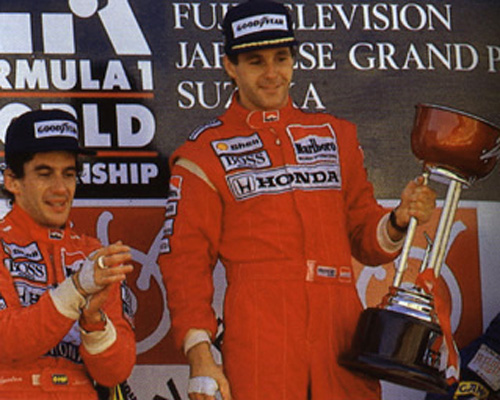
Senna & Berger, Suzuka 1991
And
that year Ayrton realized that McLaren wasnít functioning as perfectly as it
used to, it wasnít possible for him to be satisfied any more. There were a lot
of mistakes and points were being unnecessarily lost - the great era was over.
That year Alain Prost wasnít one of the Sennaís biggest competitors and also
Prostís fellow countryman, head of FIA, was relieved of his duty, so that
Senna fought this year more with the problems on his own car and with the
superior Williams (driven by the hasty Mansell) and less with the authorities.
Letís
look back at the race in Interlagos to understand to the full how well was
Ayrton able to cope with unpredictable problems which occurred during races and
how much willpower he was able to invest in it. Because the 1991 season is
Interlagos: the first victory at the home track and most probably the best
personal victory of Ayrton Senna (except the race in Donington 1993, which is as
much important as this one, but out of different reasons). Here, in Interlagos,
Ayrton surmounted extremely huge difficulties on the car that followed in
succession with literally almost only superhuman will power. It was a complete
win of spirit over matter.
"I felt it was my duty to win in
"It is incredibly difficult to drive so long in sixth gear. When you have to break from 300km/h to 70 without being able to change down, the engine is still pushing you forwards on full power. I was very often on the brink of sliding off!", he was talking about it.
Beside
all that, there was also a constant danger for engine to stall: Senna had to
change his driving style completely in this new situation, he had to suppress
terrible pain in his muscles, which was coming in waves, and, moreover, he had
to be careful, because the track was getting wet. At the first impression it
looks like rain wasnít his ally this time, but yet, if look a bit more
carefully we realize it was, because Patrese, who was driving the second
Williams car (Mansell was out), would have probably at least tried to attack
Senna if, along with everything else, rain hadnít come down. And when there
were Senna and rain in front of you, the second place was the first.
And
Ayrton pushed himself forwards: "Iíve
always said to myself itís OK, you can do it, itíll work..." And he
prayed his short prayer: My God, my God, please donít leave me...
"I believe God gave me this victory" , he unbosomed himself to us.
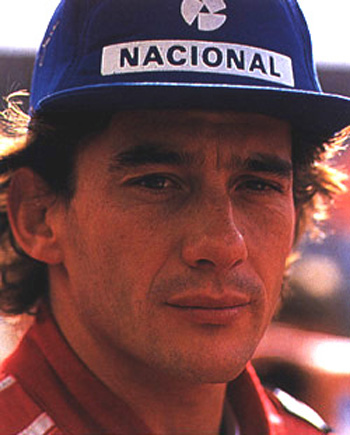
And
in the moment when he crossed the finishing line in front of all Brazilian
people as first, he also crossed the limit of a mortal. A driver who has drawn
out from himself and from the car everything a human being possibly could (and a
little bit more), was sitting feebly in a stalled car a few meters from the
finishing line. In that moment he found himself in vacuum and the only reality
was the ripping pain which was finally allowed to break out. They helped him to
come out of the car because there was still something he felt obligated to do at
any cost. He had to go on winnerís podium there. From that moment on he stayed
forever on that podium for his countless admirers. He moved among gods. Death
that took him only sealed this status - he became immortal. Here we could
witness how gods originate among people. Greek and Roman immortal heroes rose in
a similar way and already mentioned Alexander the Great transformed (while he
was still living) from the king of Macedonia and leader of all Greek people to
divinity in front of whose sculpture sacrifices were being offered and all
because he knew how to turn lost battles into victories.
"In
many ways we are a dream for people, not a reality. That counts in your mind. It
shows how much you can touch people and as much as you can try to give those
people something, it is nothing compared to what they live in their own mind, in
their dreams, for you. And that is something really special, something really,
really special to me",
these are Ayrtonís words on that subject.
Here
in Interlagos thereís one scene which touches a person very painfully in the
heart. I know it will look extremely contradictory when I try to describe it but
Iím simply not able not to mention it. Namely, when absolutely exhausted Senna
is going out of the official car one can see his face and eyes for a moment. He
was happy then, he said so himself. He was really happy, happy because of the
incredible way that he had won, happy because of the fulfilled dream of
countless fans, happy because of himself, but then again that wasnít a face of
a truly happy person. It was a face of an extremely lonely person, face of a
person which shows a need to immediately share this almost unbearable moment
with somebody who would understand it. The eyes are searching for a person so
special and close that he could lay his head on her shoulder, in order to find a
rest for at least a second. The fact that he laid his head on his fatherís
shoulder doesnít mitigate, but emphasises this loneliness, because his family
wasnít away from Ayrton, it was a part of him. And his soul mate who would
correspond with ideals worn in his heart and who would understand him in his
special spiritual world Ayrton had been searching for all his life
unsuccessfully. In that seeking he came across many people whom loved him but
love doesnít necessarily include understanding. That was the reason why, at
that moment in Interlagos, among endless mass of admirers, there where people
loved him so much they would give their lives for him without a thought, Ayrton
da Silva was absolutely alone, alone with his thoughts. There wasnít anyone
who would follow him in those thoughts.
His
most intimate wishes never came true. "One
day I will have a wife and children and I hope I will know how to help them and
to pass on to them the experiences I have collected", he confided to us
when he was asked about his dream.
He
had one more wish (which he knew would always remain only a wish), a kind of a
vision of his own future. "One day I
will allow myself to pay off all the money, note for note and then Iíll live
only in harmony with nature."
And
something professional? He had that kind of wish, too: he wanted to finish his
racing career driving for Ferrari. "Even
if the Ferrariís car is a slow as a Volkswagen Beetle I still want to be
driving it on my last start, my last lap, my last race. Ferrari is the myth of
Formula 1. The tradition, the soul, the passion."
Those
were the most intimate wishes of Ayrton Senna, painfully modest for a person who
could have wanted and achieved everything which this world was offering to him.
But it seems that he wasnít of this world.
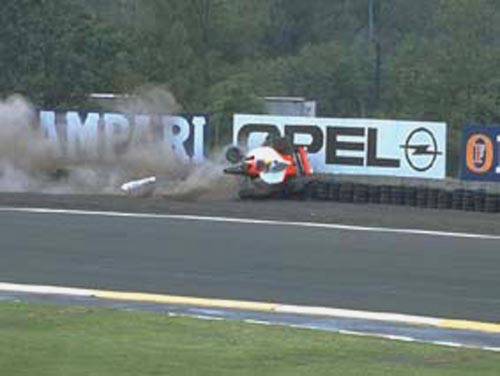
Mexico 1991
Something
else also strikes oneís eye in 1991. Ayrton was injured more times that year.
The accident in
1992.
THE HOPELESS YEAR
That
year it was definitively clear that Williams was the best car. And Nigel Mansell
was driving it. It must be admitted that he, most of all people, was trying to
beat Senna out on the track. He succeed in it that year. Even a driver like
Senna couldnít overpower technological advantage of the Williams.
"It was hopeless from the beginning" - confessed Senna, but some
races are still his and they are remembered. Like the duel with Mansell in
"I could suddenly see myself from
outside sitting in the car. Around the car and around my body there was a white
line - like a wave. I saw strength and protection in it."
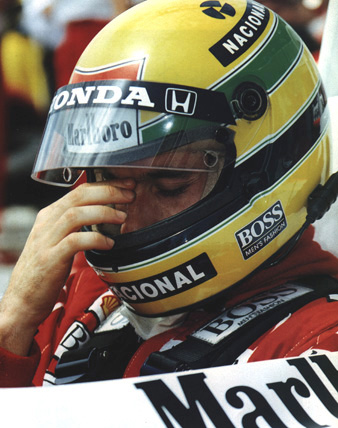
What
kind of extreme concentration is necessary to experience something similar, only
very few people know and for a racing driver it is a precious quality. For us,
spectators, it is only a man and a machine functioning in harmony and only some
extraordinary situations which disturb this functioning make us excited. And
every extraordinary situation is a shock to nerves for a driver, going in for an
exam anew. Thatís why all the racing drivers are people with special nerve
structure and an average person in normal life never experiences that kind of
pressure. Ayrton tried to describe how he experienced races a couple of times:
"Every
thin vein of my body is more sensitive, my head works like in no other situation.
I can smell the grass on the edge of the track, gravel and asphalt too. I also
take seriously the smell of brakes when I step hard onto them at high speed. The
sensors of my body receive every vibration of the car. All information of this
sort rush simultaneously into the head but Iím still able to distinguish,
understand and individually interpret them. It is an unbelievable, fascinating
feeling - you become a part of the whole."
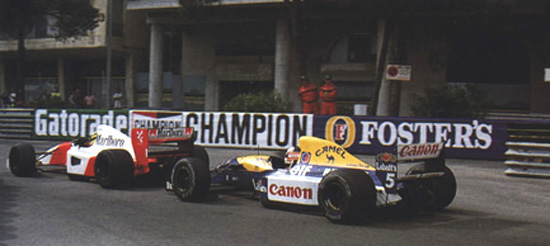
Senna & Mansell - Monte Carlo 1992
Indeed,
his nerve cells were functioning in a special way and in
"As
a circuit it is the greatest challenge in the whole championship because you are
driving relatively fast and there isnít the slightest room for a single
mistake. Because there simply isnít any space.
But
otherwise Ayrton didnít like to stay in the notorious principality what people
couldnít comprehend at all although the reason is very simple.
"I
would like to go to
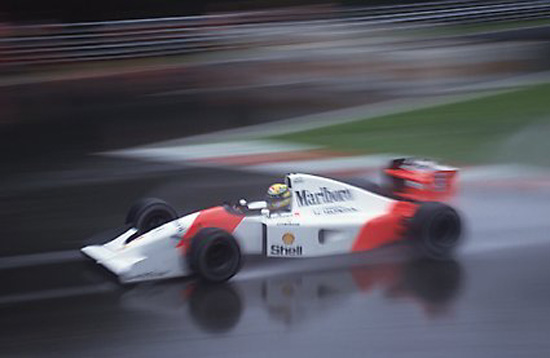
Belgium 1992
The
1994 race in
Monaco
was held without him. Position no.1 on the starting grid remained empty. The
fashionable and to Ayrtonís heart foreign city lost its idol without changing
its concrete style of life even a little bit. The change happened somewhere
else: in the hearts of many people all around the world, where Ayrton moved in
forever.
1993.
- DONINGTON UNDER RAIN
Although
it wasnít known then, 1993 season was the last full season for Ayrton Senna
and it was extremely demanding. Ayrton was fervently searching for a way to go
on that season. He was driving for McLaren without a permanent contract, only
from race to race; the whole year was in fact a fight on more fronts for him. He
was still persistently trying to get hold of the Williams car which was the best
car at that moment and fervently wanted to achieve his aim (he even had to fight
out his own death!). A piece of information that he offered Frank Williams (who
has a reputation of a curmudgeon) that he was willing to drive the Ď93 season
for free, reveals how ardently he wanted to drive a competitive car again. The
irony is that the only thing he achieved by doing this was that Frank Williams
didnít even think to seriously take the world champion Nigel Mansell into
consideration any more and pay to him the amount he wanted, so that embittered
Mansell left F-1 and went to America.
And
Ayrton was, besides all the maximum engagement in F-1, also intensely working on
his other projects because it was long since he was living only for F-1 as one
might think when looking at his constant, 100% dedication to this sport. F-1 was
his passion, his means to express himself best, but he was also involved in many
other projects in order not to become despondent, because sometimes the
situation in F-1 was of such a kind that it would force him to say words like
these: "Forget it, Iím getting to
the point where I donít care..."
He
fought in his own manner against moments of despondency such as these:
"I
have experienced that a few times during my career and I have also learnt from
it, learnt to cope with it. One way of dealing with it is to do different things,
to have different projects and to see how they develop. For then they become a
motivation, a source of satisfaction and positive feelings. And you can
transform that into energy in order to continue. You need plans for the future,
things that you see gradually growing, that you can be glad about. If you donít
have that and just wait for something to fall from heaven then itís much more
difficult. And you need different things. Then if one thing isnít going so
well you can turn to another one, and suddenly perhaps the first one will start
working better again, too. You have to create new things and invest in the
future. Thatís the only way to live for the future."
He
saw to the future of his projects. At the beginning of 1994 he said:
"1994 will be the year in which the "Ayrton Senna Group" will really become independent, from which all my business projects will develop their own existence independent of my career as a racing driver". Unfortunately, it turned out to be literally so.
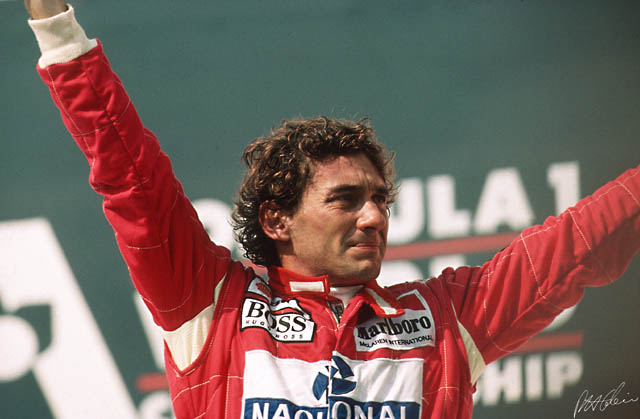
Ayrton Senna after winning in Interlagos 1993
The
1993 season also seems to be a short account of the whole Ayrtonís career. As
if all important elements from previous seasons were joined together in this one
season, as if he had to live them all through again because his time was coming
to its end. He had an inferior car and he couldnít win the championship
despite his great effort. But winning one more title wasnít of any deeper
importance at all any more because Ayrtonís life mission wasnít winning the
most titles in the history of modern F-1 era.
In
1993 the time came for Ayrton to win in a different way. "Do you now have
the feeling that some of the things which happened in 1993 were perhaps
predetermined?", he was asked at the end of the year, and he replied: "Yes,
I really believe they were."
Really, some events that year were destined to show things in their real light and to through it soften the bitterness which weighed down on his heart painfully for a very long time. First he unexpectedly won in Interlagos the second time and celebrated this victory "over the moon", as he expressed himself. In general terms he didnít care much for parties. He very much loved and enjoyed showing what he knew and how he could do it but as soon as he would cross the finish line he would say "over" in his spirit and direct his thoughts to the next race which awaited him. Congratulations, celebrations and everything else that goes with it werenít of any special importance to him. He was happy, of course, but the celebrations were more of a dedication to all people who took part in achieving this victory and to all fans - a present for them so they have something to be happy about. The same was with all trophies, victories and titles. They still werenít a priority to him although this assertion looks preposterous at first sight because what has been important for Ayrton in that case? What was the true reward that belonged to him only? He answered that question to us, too.
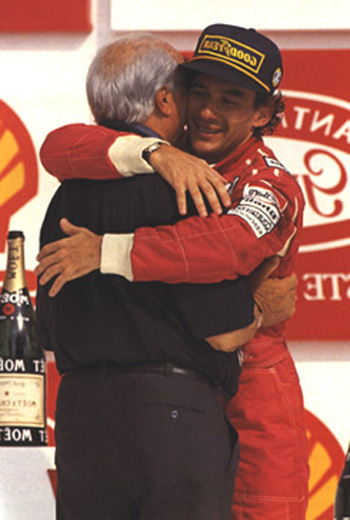
Two legends of F-1 - Ayrton and Juan Manuel Fangio, Interlagos 1993
"In
the seconds before the start, when the engine is started, I let myself go,
somehow let myself fall. All conscious thinking ceases, everything flows on
quite naturally as though of its own accord. There is a rhythm, something like a
perfect melody. Not always, but there is always the eternal search for it. When
I find it then I drive in another dimension. Controlled, but totally free,
steered only by my very own, I would almost say innate instincts. I am there in
present, but I am also ahead of myself and of time. I sense intuitively much
more than I calculate. Unfortunately, those are only rare moments, but wonderful
ones."
That
was that something he was constantly looking for. It was the true reward for his
absolute giving, reward which was showing him anew that his work is noticed and
adored. Thatís why it is possible to place two assertions of Ayrton, which
sometimes seem to be contrary, next to one another, without making a true
contradiction. Sometimes heíd say: Statistics
don't interest me. My goal isnít breaking Fangioís record, it will always
remain matchless; and sometimes the following: Only victories satisfy me. To be second means to be first of the losers.
These statements would be absolutely contradictory without understanding of
Ayrtonís soul and the emotional states which he was experiencing. Apparent
contradictions such as these are typical for people who are forced to live
according to commonly accepted rules and who, at the same time, have to follow
their own fatefully.
But
in 93, Ayrton exceptionally celebrated victory in Interlagos in the usual way -
tempestuously, until the early morning hours, and on that occasion he also met a
"dream-girl" who brought him an illusion that last year that he had
found "the real thing". The future showed us everything was really
only an illusion although he himself surmised some things. It wasnít possible
for him not to see that this 19 years old woman was mentally still a little girl
but her image was cut deep into his heart and her simple-mindedness was a rest
for him. In a way characteristic of him he took responsibility for her hoping
that she will succeed in learning the real values in life and that they will be
able to plan their future together. Adriane was also showing credulity beside
her simple-mindedness and he had to fear such a innocence. Only a few days
before his death, he said:
"Even
when you are beside a woman that you love you might think she could make you
unhappy in the future. The relationship between a man and a woman is the oldest
thing which exists in humanity, and there are still no formulae to guarantee
love, peace and success of a relationship. For this reason relationship must be
valued day by day. It is not only the dream that most of us have but the reality
that we must evaluate."
Although
he influenced Adriane in an educative sense, he wasnít jealous as journalist
had written, and neither did he forbid her to follow her profession as a fashion
model. He only knew how things in that branch work and he tried to protect her
from humiliation. She talked about it herself in her book and affirmed best that
she didnít understand Ayrton at all. She was just nodding her head without
understanding the essence. The best proof for that is the situation when he let
her to decide for herself and make a story for the magazine "Caras".
With a credulous confidence Adriane gave herself into the hands of people who
took advantage of what was offered in a very perfidious way. The pictures which
were taken are right on the edge of what we call "good taste". They
didnít cross it, but they allude more than too much on certain things (Adriane
who was in love with herself wasnít able to understand the very fine line
which divides good taste from bad). You can imagine how surprised she was with
Ayrtonís reaction after seeing the final result. She didnít understand a
single word of what he tried to explain to her. The only thing she understood
was that he was angry with her and she looked so beautiful on those wonderful
photographs... Adriane didnít comprehend the complete impression and allusions.
Adriane Galisteu at Ayrton's funeral
And
what was left for Ayrton to do in that situation because he realized he
couldnít leave her to act alone any more until she learns some codes which
were understandable for those in his immediate circle? He set out to mitigate
the bad impression - he sent photographs to ďCarasĒ which he chose by
himself and those truly wonderful art photographs present him and Adriane as a
couple. Here he had to use his own personality to try to worthily present
Adriane as his beloved. And he asked her to obtain the slides which were taken
of her own accord - he wanted to get those ambiguous pictures under control.
This proves that he sincerely fell in love with a little girl (this is how he
called her), to that extent that he wanted her to become his wife. He asked for
those slides because he was thinking of the future, of that future which he
didnít live to see and which showed to us that what seemed to be naivety and
credulity is most probably a personality trait, because Adriane permitted
everything what was denoted with allusions on those pictures from "Caras"
to come to its vulgar end after Ayrtonís death. She cruelly humiliated herself
and through herself also Ayrton, she is the only person who succeed to hurt him
even after his death. A glance at her pictures from the Playboy really hurt.
When we see them we canít help asking ourselves how it is possible that at
least an echo of Ayrton didnít remain in the soul of that girl, how could she
turn out to be so empty? With no intention to be cynical, a conclusion suggests
itself to me that Adrianeís role in Ayrtonís life was only to be a "warriorís
repose" in his last months, because how would it otherwise be possible that
absolutely nothing of their year wasnít strong enough to be remembered? Under
what sort of influence did Adriane fall after Ayrtonís death to make the final
result so crushing? Or did she carry all of this inside her heart all the time
which then makes it even more crushing. But, was it supposed to end like that?
If the little girl had been officially secured with an annuity from Ayrtonís
money, maybe that would have prevented this big humiliation or at least there
wouldnít have been an excuse for it. Ayrton would have surely wanted it no
matter what had happened, Adriane was the person he loved and this fact had to
be respected because nobody knows how things would have developed if he had
stayed alive.
Adriane was often with Ayrton during the races that year but she wasnít present at the most important one in Donington where one of his greatest victories took place. That race was a satisfaction in every way. We know that we canít direct our lives, but when we talk about Donington, we get an impression that the director there was Ayrton himself. Because the circumstances folded in such a way that he was able to show his ability to everyone and even to himself. "That race told me everything to myself. It was what I wanted to prove to myself", he said. No one could have known then that this was his swanís song.
Donington 1993
His
main opponent was Prost again, who had in the best car occupying Williams just
for himself: he ensured himself with a clause in the contract that Senna
mustnít be his teammate that year. So he bound Ayrton to, at the time already
uncompetitive McLaren. And the race in Donington started, with such relation of
power, on one cold rainy Easter Sunday. The rain had to be a part of the show at
any cost. And it wasnít just raining to be clear: put on the rain tires and
letís go. Here it was raining, then it stopped - the track got dry, then it
would start raining hard, then it wouldnít rain - the parts of the track would
get dry again. Now imagine Senna in this scenario. The way all his sensors
worked, the way he put to work all his abilities - it was an art. Formula 1
reporter from
If there was a time when Prost was completely beaten it was here, although Ayrton tried to mitigate this aspect. He didnít want to profane this race by reducing everything only to retaliation. But here it was incontestably Prostís turn to swallow a bitter pill, but in Sennaís way. Nevertheless he stayed "professor" till the end - during the winnerís interview he complained about the steering wheel and the problems when changing gear, about blocking the rear wheals and so on and on. That made Ayrtonís lucid spirit to suddenly refer to him:
"Perhaps we
should change cars."
After
this race, the ice which was tightening Sennaís heart began to melt. Thatís
why it was possible to sincerely shake hands with Prost at the end of the
season. The time for it had come.
"With
all the differences, the problems we had, we are both sportsmen, both world
champions, we both love racing. I think what has happened should be left like
this. It showed my feelings as well as his".
This
is how Ayrton was talking about his feelings and, shortly before his death in
Imola 1994, he said goodbye to his long-time rival and real enemy at moments, in
the best possible way: "A special
hello to my dear friend Alain. We all miss you Alain...", he sent word
to him from his Williams car. These words reveal the essence of his relation
towards also a great racing driver, Alain Prost: Alain was his complementary
match in racing - where Ayrton was strong, Alain was weak and vice versa. And
because of that, Prostís image next to Ayrtonís dead body was despite
everything an image of a friend.
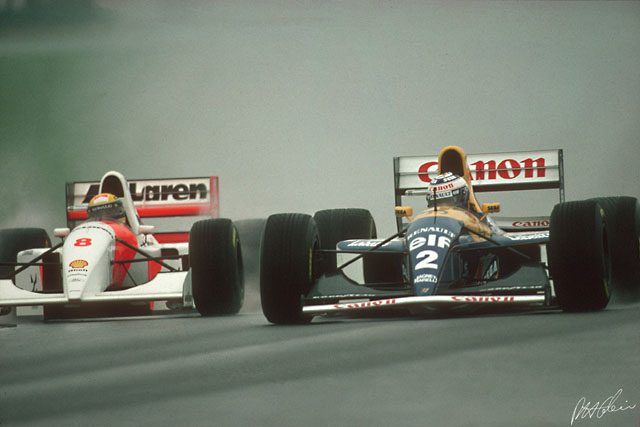
Senna & Prost - England 1993
Another
big enmity was removed from Ayrtonís heart already in 1991 in December at the
presentation of 1991 World Championship, during the FISA annual prize-giving in
"We
have had our differences in the past, Jean Marie. I donít want to get back to
it. I know you want to have something from me as a personal thing. As far as
Iím concerned, today I try to close any misunderstanding between us. What
happened in the past is past",
Ayrton said at the occasion.
He
just simply couldnít hate and he never revenged himself, although many people
thought the opposite. Sometimes it would happen to him that he would burst out
in anger in situations where there wasnít any deliberate injustice and
sometimes he reacted a little bit too quickly before all the fragments combined
to the whole and showed the real picture. But that happened only when he thought
people were trying to thwart him in something he was 100 percent sure he was
doing it right. He was aware of these drawbacks and was trying to correct them.
"I
must learn to have patience",
he was thinking and once, in an interview, he answered the question "What
would you like to change in yourself?" like this: "Perhaps to be able to accept easier how human beings are. Itís
difficult to accept certain things, but I wish in the future I could be more
flexible towards people, accepting the way they are; some with their excellent
qualities, some with their big flops. But the way they are."
Pay
attention to these words: I donít want people to accept me the way I am, but I
want to be more flexible and accept them as they are. Because, people were often
tactless and they troubled him disturbing his concentration or keep importuning
at the wrong time and place like, for example, the well-intentioned sympathizer
who advised him uninvitedly, during supper in a restaurant, to stop racing
because he might get killed. And Ayrton was in that restaurant and having dinner
with Adriane only to try to forget that and things like that, that is, he only
wanted to live normally for a moment.
He
himself was very tactful and always careful not to disturb other people
unnecessarily. He was sparing people and things just not himself. That was also
the reason you had to give your best if you were at his side in a certain
moment. All the drivers who were so fortunate or unfortunate to drive with him
felt that best. He was very tolerant but only to the limit that was defined by
his balanced soul structure. If you crossed it he would burst into anger
regardless of the consequences (like in
"Nothing
justifies hitting him and Iím not justifying myself. Iím just saying what
took place in the race was absurd in many different ways. And nobody did
anything about it, during or after the race. I went to see him and he was like a
wall. He made me lose my temper. I couldnít help it because respect is very
important between drivers. The problem was he wouldnít even think about it,
let alone say he was wrong", this is how Ayrton tried to explain it.
And
the system showed its real face once again. Senna turned out to be the only
guilty party because there was no word about what was really important (and that
was
Ayrton's last victory for McLaren - Adelaide 1993
And
the Great Brazilian ended the 1993 season again with a victory, which secured
the McLaren team predominance in the history of F-1. With 104 victories they
became "number one" ahead of Ferrari. Could you think of a nicer gift
to the team to whom you are saying goodbye? Because Senna was definitely going
to the Williams. Prost couldnít block him any more so he preferred to retire,
with four titles in his pocket, and Ayrton was looking forward to a new season
like a child. It finally seemed to him he would be able to drive the way he
wanted in his spirit, that is, "faster than himself", and to do that,
he needed "a car from a different planet". The Williams car promised
to be that exactly but the beginning of the 1994 season immediately showed that
this was only his second illusion. "I
feel I have arrived here two years late. The car drives funny", he
complained in his most intimate circle dissatisfied with the car which he got,
and during the testing in
"Typical, Iíve hardly arrived at Williams and they promptly screw
things up with the car..."
*
The author of the song is Margaret F. Powers. She published it and described
its history in the book ďFootprintsĒ (HarperCollins, Toronto, 1993).
This true story has inspired many and one of them was also Ayrton Senna.